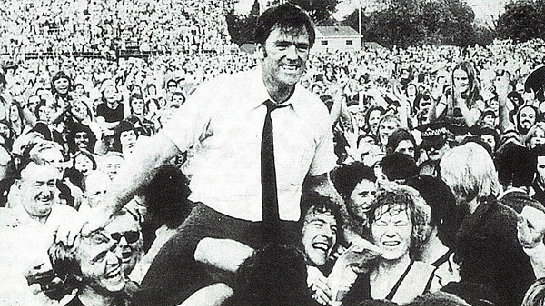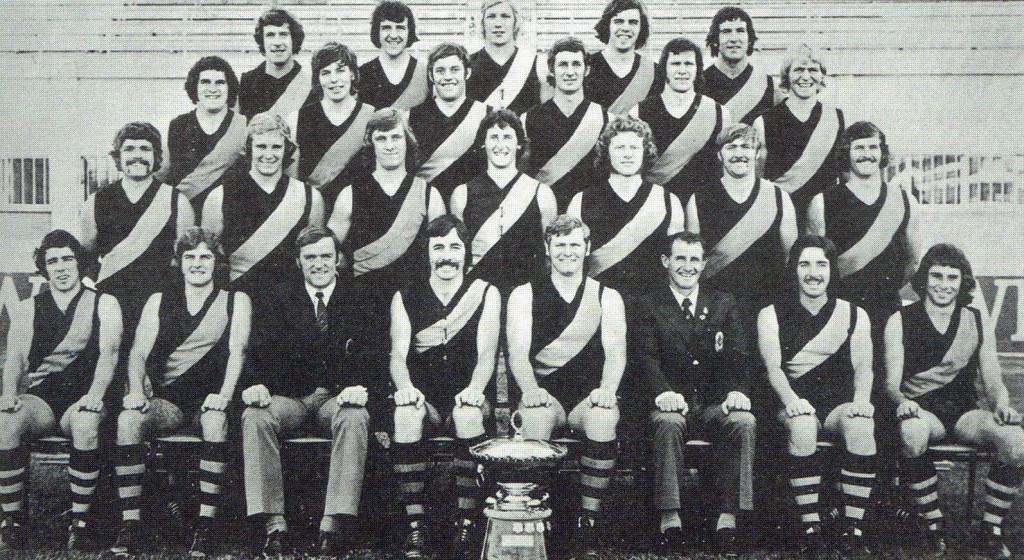The Greatest Game of Football Ever Played

I was ten years old in 1973 and already tempered by watching Glenelg lose Grand Finals. At the time, only the middle aged recalled our one Premiership season, a glorious against the odds win over Port (in 1934). Since 1967, the Club under Neil Kerley had gained new respect but that tended to dissipate each Spring.
In 1973, as 1934 (and 2013), we had finished 6th the previous year. But in 1973, it seemed the Tigers couldn’t lose. Wins piled up so frequently that when we dropped a game (at Prospect) it came as a relief.

Glenelg 1973 Grand Finals Team Photo
So when Grand Final Day came around, we were warily optimistic. Wary, as North Adelaide confronted us. Premiers in 1971 and 1972, Champions of Australia in 1972, the only team to have beaten us in the regular season, they had serious talent and leadership: Coach Mike Patterson, the brothers Robran and Sachse, full-back Bob Hammond, the best ruck combination in the league in Spry and Sporn.
The day itself was a presage of summer, a brisk warm northerly gust keeping the old mercury over 85F. Officially, 56,525 jammed into Adelaide Oval, which coped easily, despite no billion dollar upgrade. 1973 marked the last Grand Final there until 2014.
If you watch the replay, recorded in black and white on very few cameras, you’ll see how the game has changed. Despite a handful of outright howlers, a sole field umpire, Murray Ducker, kept good control of the game (and without a mike). How oddly gratifying to watch long periods of play and not notice him!
There were hoardings (mainly advertising cigarettes) but no sponsors’ names on guernseys. The players had a lot of unkempt hair and none of them feared going hard at the ball or the man. Goals were celebrated with a minimum of fuss and the best player on the day got a watch. It was hard, fast and free-flowing, attacking football.
Game highs and lows – First & Second Quarters
North kicked with the wind and scored early through Rodney Robran. Brilliant close-in work by Fred Phillis led to Rex Voigt answering at the northern end. The action was fast and furious, with North reaping the breeze late to lead by 21 points.
Umpire Ducker, on the members’ side, somehow concluded Greg Bennett was holding the ball when no one laid a hand on him, which helped fire us all up. I was near the pickets on that side of the ground with my best friend, Scott Williams and my other good friend from primary school, Warren Churchett (now sadly gone). We agreed that the scores would even up by half time but as I recall, none of us saw Bob Tardif, our lead ruckman, grab at his hip after a ruck contest.
John Sandland replaced Tardif early in the second term, leaving Bob Tregenza as our only ruck against Sporn and Spry, two of the best in the business. This he did all day, driving himself relentlessly (and later, to hospital) with some stout assistance from Twiggy Caldwell. Thus the team covered what could have been a “major catastrophe” and by direct, attacking play, gained a lead of a goal at the half.
Game highs and lows – Third Quarter
The Bays defended by attacking into the wind and though North hit the front near the bell, Rex Voigt answered twice to give us an eight point lead at lemon time, to come home with the persistent breeze. Scott, Warren and I were hopeful.
Game highs and lows – Final Quarter
Nothing about the first 15 minutes suggested that either side were wilting. It was goal for goal and the Tigers had eked out a 15 point lead courtesy of Voigt, Carey and Bomber Hamilton, who was thrown on to a flank after taking the full force of a textbook hip-and-shoulder. Scott, Warren and I were feeling smug but Adrian Rebbeck, who had come on late for the Roosters, bobbed up with goals and kept them in touch.
The next 15 odd minutes were a sweat-soaked, nail biting, heart racing nightmare of the mind and nerves. As nicely summarised in Pride of the Bay “… for the next 15 minutes Glenelg, stonewalled by an inspirational, desperate effort from North full back and captain Bob Hammond, could not score.” Meanwhile, North attacked repeatedly; Collins and Marriott warmed up as both Coaches got increasingly twitchy; Millard found Voigt with a pass and he steered through his 7th goal, only to have it disallowed for illegal shepherding – the umpire’s biggest error of the game.
From that free, North went the length of the ground in quick time, as Ian Aitken cried “It’s got to be a North Adelaide goal, surely!” The enemy clawed back to within 7 points and we were rattled, no doubt of it. Marker and Caldwell collided going for the ball and with “players nearly at a walk”, Dennis Sachse grabbed a mark and goaled, to leave us a solitary point in front.
Kerley swung Fred Phillis into defence as a loose man where he did some good things but this meant that Hammond became even more dominant, turning back all of our forays and marshalling constant counter-attacks. The Bays seemed to be holding on, holding their breath and awaiting the end …North went forward again and as Ian Aitken calls it:
“…here comes Colbey on sheer guts, that’s all he’s got left: he angles it down and it’s all North Adelaide in defence…the Glenelg forward line is shot: Marsh is across there…Marsh comes around the corner – there’s only about 3 minutes left – a good kick! And there’s Rebbeck – steadies – Colbey’s gone, they’re all gone…towards centre half-forward – up goes Freddie Phillis: the brilliant Robran…” and his voice is drowned out as Robran left-foots it to the square where John Plummer marks, the crowd screams or groans, the North Coaching bench does the conga and Aitken, audible again, exclaims “They’re going to win this, North Adelaide!”
I admit that at this point, believing we had snatched defeat from victory’s jaws, tears welled up.
The coup de grace
Amid triumphant whoops from its supporters, North, now 5 points in front, attacks again. But Colbey gets a free at centre half back and dinks the ball over to Anderson, who lopes up the wing. Wally May reminds listeners, as if any need reminding, that Glenelg have “got to get a goal”.
And then, almost in slow motion, the battle for control of the ball; Hammond again, paddling it near the line; Sachse takes over and handballs away but a fresh and fast Craig Marriott gathers and sends a Hail Mary kick over his head and there is Cornes, floating way up in the air to grab the ball, writing his name into football legend.
May sums up: “Well, he’s got to do it, if you can mark like that and kick straight and win a Grand Final, you’ll never ever forget it. All the strain on number 12. Every bit of strain.”
And of course, he does it. Despite a less than dominant performance throughout the day, Studley pops through a goal from 30 or so metres out on a 45 degree angle, cool as a cucumber, to put Glenelg a point up with 5 minutes of time on played.
After that, still more drama. North come again – Jim Rawson smothers the kick that might have robbed us and as he lies on the ground with a free kick for the most blatant push-in-the- back in history, Aitken enthuses, “You’re witnessing the greatest game of football ever played, in my opinion. A fantastic conclusion to a brilliant season.” (His co-commentator, Max Hall, must have felt compelled to hose things down, promising the chance to see 15 minutes of edited highlights of the game at noon the next day.)
Glenelg, with its second wind, pressed forward again and Sandland marked and goaled after the siren and the day was ours. As the alliterative banner proclaimed, the “Tremendous, Talented, Tenacious, Terrifying, Tear-Away Tigers” had finally proved their worth!
I confess partiality. I may have an unhealthy obsession with this game, tending to watch portions when the present team is having a lean run. As a fellow-VP, Torrie Osborn, points out, I should focus on Glenelg’s future efforts, not those of its past. But there is a place for nostalgia at a Football Club – it can sustain and cheer; it may even inspire.
So, did Ian Aitken exaggerate? I maintain that he got it right. The 1973 SANFL Grand Final was the greatest game of football ever played – for the circumstances leading up to the contest and of the day itself; for quality, intensity, tension, drama, and honour.
¹ DVDs of the game can be bought at the Club. The commentators were Max Hall, Wally May and Ian Aitken.
² The team was Peter Anderson, Greg Bennett, Neville Caldwell, Peter Carey, Brian Colbey, Graham Cornes, Kerry Hamilton, Stephen Hywood, John McFarlane, Peter Marker (C), Craig Marriott (res), Peter Millard, Fred Phillis, Wayne Phillis, Jim Rawson, John Sandland (res), Bob Tardif, Bob Tregenza, Rex Voigt and Greg Wickens.
³ Peter Cornwall and John Wood, page 206. Chapter 13 gives a comprehensive review of the game and season.
4 It is difficult and perhaps unfair to single out best players in such a game. Bob Tregenza, Wayne Phillis, Peter Carey, Rex Voigt, Kerry Hamilton, Peter Millard and Peter Anderson gave their all for four long quarters but really, all played well. The same goes for North, for whom special mention must be made of Bob Hammond, Barry Robran, David Marsh and Adrian Rebbeck.
Leave a comment...
While your email address is required to post a comment, it will NOT be published.


16 Comments